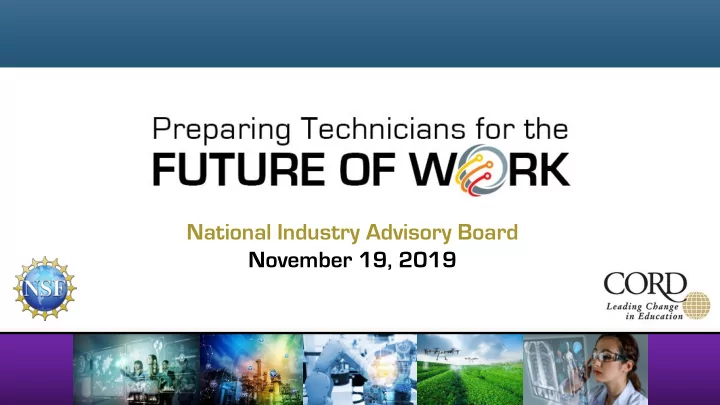

National Industry Advisory Board November 19, 2019
INDUSTRY SITE VISITS
Emerson InSinkErator, Racine, WI
Racine, WI
Bradshaw Medical, Kenosha, WI
Wake Forest Institute for Regenerative Medicine, Winston-Salem, NC
Future of Work Observations from the Site Visits 1. More robots and more cobots with more functionality, which means they're more complicated and more connected, are being installed everywhere. 2. Most technicians need to know more about digital communication protocols between equipment. 3. More connected and automated robots and machines mean more challenging troubleshooting situations.
Future of Work Observations from the Site Visits 4. Across all the operators and technicians, strong fundamentals in math, science and technology are key to understanding the new equipment and processes 5. Employability skills (or the soft skills) are still extremely important — maybe even more so today than they have been in the past. 6. Business knowledge is a minimal if at all characteristics expected of technicians and advanced operators
Future of Work Observations from the Site Visits 7. Cyber security ( with exception of general behavior awareness, phones etc) is not a concern as related to technicians and advanced operators. 8. Industry 4.0 is not a full bloomed reality but is being implemented almost one sensor at a time.
WINSTON-SALEM REGIONAL CONVENING
Winston-Salem Regional Convening Preparation ▪ Subject Matter Expert review of the knowledge and skills terms used at the HI-TEC SIG ▪ Partnership with Forsyth Technical Community College ▪ Recruitment of participants from regional ATE projects, industry, workforce development entities, colleges and universities
Convening Presentations ▪ DATA: Todd McLees, Founder, Pendio Group and Rethink Ecosystem Hub ▪ DIGITAL: John Sands, Principal Investigator, NSF ATE Center for System Security and Information Assurance ▪ BUSINESS: Donald McCoy, STEM Education Consultant; IBM Global Workforce Development (ret.)
Convening Process ▪ Small groups given knowledge and skill lists with working definitions ▪ Each participant asked to mark if a topic is “taught” or “not taught” ▪ Facilitators guided discussion, asked probing questions, noted trends
What We Learned: Taught Not Taught Data Visualization Data modeling Analytics tools Computational thinking Statistics Data management life cycle Automation/robots Artificial Intelligence Security controls Digital twins Basic programming Edge computing Communication Blockchain Continuous process improvement Overall Equipment Efficiency (OEE) Ethics Vertical and horizontal integration
Feedback for Project Team Follow-up ▪ “Teaching methods are out -of-date; professional development is needed.” ▪ “Make skills more transferrable among/between classes, across different disciplines.” ▪ “You could build a library on how to teach these topics.” ▪ “Using common terms between educators and industry would be helpful.”
What NC Regional Convening Participants Value ▪ Information about workforce skills needed in the future ▪ Information about this Future of Work project ▪ Information about how to prepare students for skilled STEM technician careers ▪ Professional development for faculty ▪ Opportunities to network
YEAR 2 OUTREACH PLAN
Year 2 Outreach Plan Continuing/Repeating: New/Proposed: ▪ Regional Convenings ▪ AACC Conference ▪ Conference Presentations ▪ Manufacturing Technology Conference ▪ Special Interest Groups ▪ STEM for All Video Showcase ▪ FLATE Focus Articles on the ▪ Expanding social media channels Future of Work ▪ Board outreach materials/strategies ▪ Website, podcast, blog posts preparingtechnicians.org/board
Next Steps • Selecting next regional convening sites • Developing a method for evaluating site visit data • Begin developing library of lessons for faculty use around the KSAs • Continue/expand outreach
BOARD BUSINESS
Proposed Mission Statement Revision Current: To enable the ATE Community to collaborate regionally with industry partners, within and across disciplines, on the transformation of associate degree programs to prepare US technicians for the Future of Work . Proposed: To enable the ATE Community to collaborate regionally with industry partners, within and across disciplines, on the transformation of associate degree programs to prepare US technicians for the work of the future . Project name and branding will remain the same.
Using LinkedIn to Promote the Project
www.preparingtechnicians.org An Initiative of the Advanced Technological Education Program
Recommend
More recommend